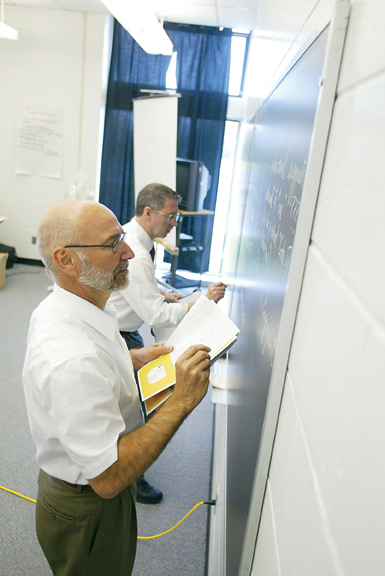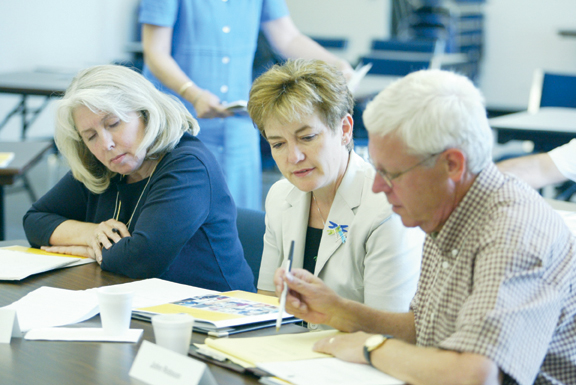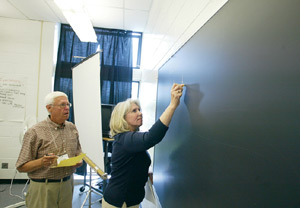|
by Lois
Browne
Two years
ago the College wrote its members to tell them what little there was to
know about the provincial government's then-recently announced Professional
Learning Program.
College members were informed that the legislation would require them
to successfully complete 14 approved Professional Learning Program (PLP)
credits every five years in order to maintain their licence. This professional
learning was to include seven core areas and seven electives and have
an assessment mechanism.
"We made some promises in that letter," says Registrar Doug
Wilson. "The College committed itself to developing a program that
would serve the interests of its members as well as the requirements of
the legislation. We promised to increase the availability of professional
learning and to ensure that it was of a high quality."
Now, two years later, there are about 450 approved providers and nearly
4,200 approved courses. More providers and courses are being added every
month and up-to-date information is available to members on our web site.
Members have earned more than 64,000 credits and credits are being added
to members' PL Records every day.
The PLP is fully functional, growing and gathering momentum.
Early days
"At first, the government had considered regular re-certification
exams for all teachers," says Registrar Doug Wilson. "The College
informed then-Minister of Education Janet Ecker that written tests for
practising teachers had not been successfully introduced anywhere in the
world."
The College proposed an entry-to-the-profession test for new applicants
to the College, a two-year induction program for new teachers and an orientation
program for teachers trained outside Ontario.
In the end, the government went ahead with the PLP for Ontario's experienced
teachers, and shortly afterward introduced an entry-to-the-profession
test. Induction and orientation programs are still in development.
The legislation that governs PLP established a Professional Learning Committee
at the College to implement the program. The committee comprises four
members of College Council, two College members-at-large and three additional
members appointed to the committee by the Minister of Education.
The committee has approved each development of the program. And the commitment
of individual committee members has been key in keeping the PLP growing
and on track, ensuring that decisions were made and implemented in a timely
manner.
Two years later, the PLP is running at full throttle and although the
program was not what the College had suggested, says Wilson, "The
PLP committee has worked hard to make it work for the profession."
Promises kept
The College planned that the implementation of the PLP would be staged
and incremental. Our computers randomly chose 40,000 members to begin
the program in September 2001 and brought the rest of the membership into
the program a year later. The staggered introduction allowed time to enlist
providers that met appropriate criteria in order to offer the broadest
possible range of professional learning opportunities.
The College also promised to clarify the definition of a PLP course. The
word 'course' suggested a vision of professional learning that seemed
unacceptably narrow. The College expanded the definition to encompass
the many ways in which members pursue professional development.
Today, PLP courses include a variety of learning opportunities that further
teachers' skills and professional development. These include:
- conferences,
- workshops,
- research projects,
- participation in
school councils,
- mentoring,
- professional portfolios,
- participation in
various education-related organizations,
- design of professional
learning sessions,
- contributing to
a textbook or other learning resource and a variety of job-embedded
projects.
The possibilities
are as varied as professional learning has always been for teachers.
Choice offered
 From the
outset, the College recognized a need for an expansion of the number and
kinds of providers if the PLP was to have the depth and range of professional
opportunities that were needed. From the
outset, the College recognized a need for an expansion of the number and
kinds of providers if the PLP was to have the depth and range of professional
opportunities that were needed.
Providers now include school boards, faculties of education, universities
and community colleges, independent schools, environmental organizations,
cultural organizations, museums, theatre companies, health organizations,
language schools, professional associations, subject associations, educational
partnerships as well as private businesses and entrepreneurial individuals
with an education-related service to sell.
The College is pleased to have approved organizations offering French
and native-language courses, professional learning for teachers of the
deaf and a host of other professional learning opportunities that members
want. This wide range of providers helps to address many potential problems
concerning access.
More than 11,000 College members teach in French and professional development
opportunities have always been scarcer for them than for their English
colleagues. Happily, so far the College has been able to approve a significant
proportion of French-language professional learning opportunities. Twenty
per cent of approved PLP courses are currently offered in French.
For members who live and work in less populated areas of Ontario, it can
be difficult to participate in the classroom courses that they find most
relevant to their professional needs. Moreover, nearly 3,500 College members
live outside Ontario or abroad. Online and distance education is often
essential to the continued professional development of these members.
For these members and thousands more whose home commitments do not permit
them to attend as many courses as they might like, nearly a third of approved
PLP courses are now offered online or through other forms of distance
education.
Of course, for most members, cost has been a considerable concern regarding
PLP. Fortunately, more than half of approved PLP courses are offered by
school boards, which provide professional learning opportunities for their
employees free of charge or for a nominal fee. Not-for-profit organizations
such as the Canadian Red Cross also offer lower cost learning opportunities.
Learning options
Additional Qualifications courses have always been a mainstay of the professional
development that teachers design to meet their personal learning needs.
The PLP has accorded each of these courses four credits.
At the end of 2002, the introduction of the Individual Learning Option
(ILO) provided a major advance in the flexibility and responsiveness of
Professional Learning Program. Through the ILO initiative, a professional
learning activity that is not offered by an approved provider but meets
all other PLP criteria may be submitted for credit.
Individual members complete the standard course-proposal application for
the professional learning they have completed and arrange for the application
to be submitted through an approved provider. A list of about 40
approved providers who are prepared to make submissions on behalf
of College members is posted on our web site.
 The ILO permits
members significant autonomy in the development of programs that respond
to their individual needs, including ongoing self-directed and job-embedded
learning experiences. The ILO permits
members significant autonomy in the development of programs that respond
to their individual needs, including ongoing self-directed and job-embedded
learning experiences.
Keeping you informed.
An important promise made by the College in 2001 was that information
- scarce as it was in the beginning - would become more and more plentiful.
At the launch of the PLP there was little information on how credits would
be assigned, so the College developed an assessment
table.
This table is posted on the College web site for the reference of both
members and providers and helps those submitting courses for approval
to accurately gauge the appropriate number of credits.
Over the past two years, staff undertook the day-to-day development and
implementation of a responsive and rational program, the PLP committee
approved each development in this evolution and the College web site and
Professionally Speaking have been vital means of communication with our
members and potential providers.
Quarterly updates in the Blue Pages of the magazine deliver information
to all members on the latest PLP news: credits for AQs, exemptions for
retired members, extensions for those not currently teaching at a job
that requires an Ontario certificate.
The College web site delivers up-to-date information about the program
and provides a searchable listing of all approved providers and courses,
which includes contact names, course credits and more.
The site can also provide each member with immediate access to their unique,
confidential Professional Learning Record through the password-protected
Members' Area. Potential providers appreciate its convenience when applying
for provider status and course approvals and when reporting successful
completions of their courses by College members.
Two years after the Professional Learning Program was announced by the
provincial government, it looks very different. And developments do not
end here. The program will continue to identify and meet the needs of
teachers - supporting their commitment to improving their skills, expanding
their knowledge and honing their practice.
|


